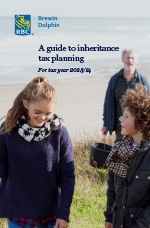What is inheritance tax?
Inheritance tax (IHT) is a tax on the transfer of wealth. Most commonly, IHT is paid by the estate of someone who has died, but it can also be payable within someone’s lifetime. If your estate is valued at above the inheritance tax ‘nil-rate band’ when you die – currently £325,000 – the excess will be liable for IHT. The standard inheritance tax rate is 40%, which on a sizeable estate could translate into a significant sum of money.
Mitigating inheritance tax
Rising property prices and the freezing of the IHT nil-rate band could see more families having to pay inheritance tax than has been the case in the past.
There are lots of ways to mitigate inheritance tax, but understanding what’s right for you and your family isn’t always straightforward. The complexities involved mean many families leave legacy planning until the last minute, when it is too late to make a meaningful difference.
By speaking to us early on, we can help you manage your estate’s IHT liability and build an estate plan that works for you. We can help you:
- Find out how the inheritance tax nil-rate band affects you
- Assess whether you qualify for the residence nil-rate band
- Explore the use of tax-efficient gifts
- Use pensions to mitigate inheritance tax
- Consider whole of life insurance to cover a potential IHT bill
- Leave a tax-efficient legacy for the next generation
Estate planning and gifting
Estate planning is about so much more than looking for ways to reduce inheritance tax. Gifting money to your children and grandchildren could make a huge difference to their quality of life and financial security. And if you pass on money while you’re still alive, as opposed to via your will, you’ll get to see your loved ones benefit from your wealth.
We can help you create a lifetime gifting plan that suits your family’s unique circumstances.
Gifting
We can help you:
- Make the most of your gifting allowances
- Manage your gifting annual exemption
- Use potentially exempt transfers and the seven-year rule
Cashflow modelling
It’s really important that you don’t gift more money than you can afford. By using cashflow modelling, we’ll demonstrate how much you can afford to give away without harming your own financial security.
Passing on your pension
Pensions can play an important role in mitigating IHT. Unlike ISAs, pensions usually fall outside of your estate and so can be passed on to your beneficiaries free from inheritance tax. We can help you explore whether it makes sense to use other investments, such as ISAs, to provide retirement income, thereby retaining funds in your pension for as long as possible.
Taking control with trusts
Trusts can help to reduce an inheritance tax bill and give you control over how your assets are used by future generations. Trusts can help you:
- Keep a lump sum outside of your survivor’s estate so it is not subject to IHT
- Protect your children/grandchildren’s legacy if your surviving spouse remarries
- Protect your children/grandchildren’s legacy from their own marital disputes
- Avoid giving children/grandchildren a sum of money that they may not spend as wisely as you would like
Trusts can be complicated. We can make a referral to a legal professional to assist you.
Common questions on inheritance tax and estate planning
This does not constitute tax or legal advice. Tax treatment depends on the individual circumstances of each client and may be subject to change in the future.
Information is provided only as an example and is not a recommendation to pursue a particular strategy.

